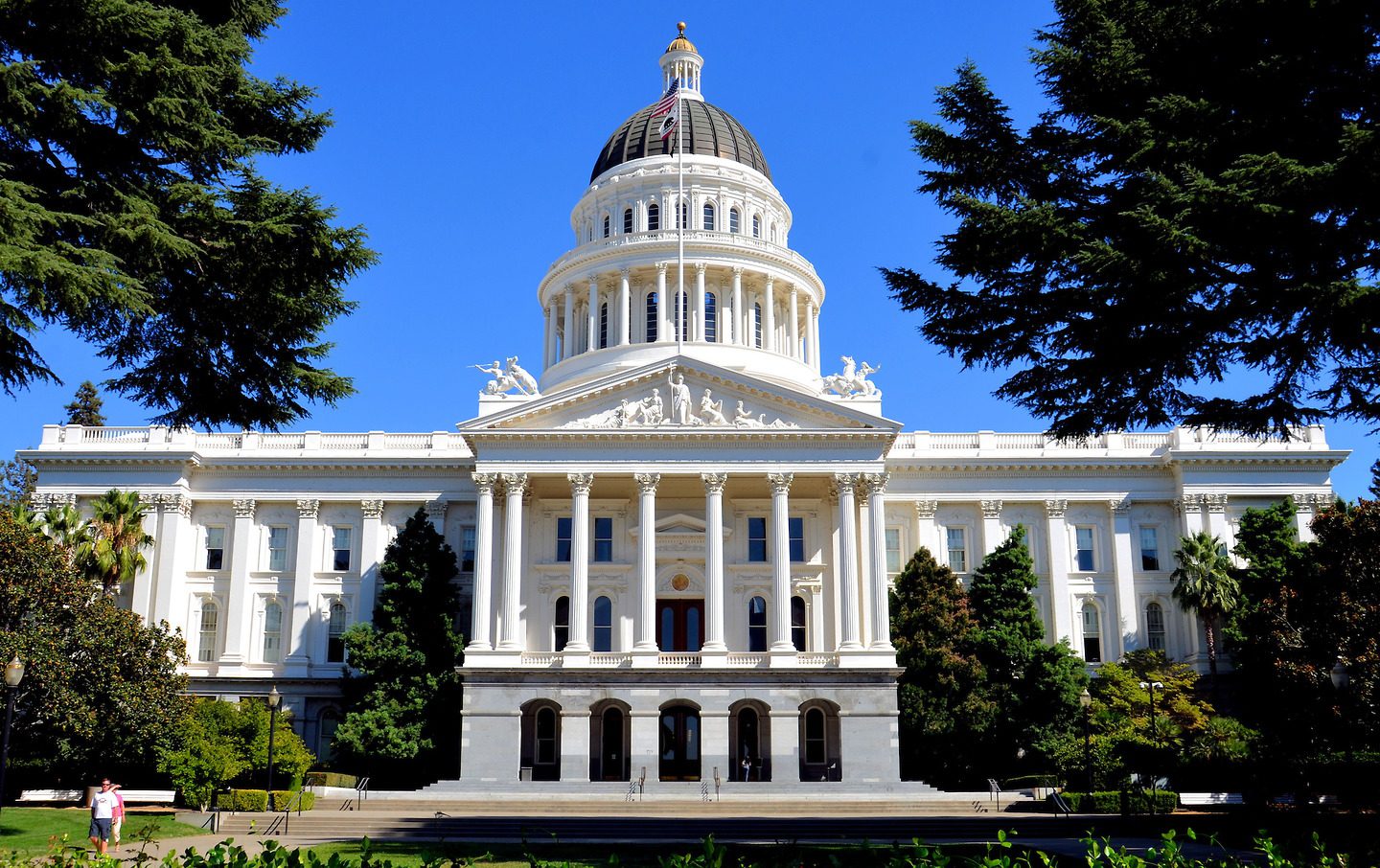Gov. Gavin Newsom’s first state budget proposal is groundbreaking in the depth and breadth of its investments in our youngest Californians.
Placing a strong priority on young children and working families, Newsom’s “California for All” $209 billion spending plan includes more than $2.7 billion statewide aligned with First 5 LA priorities including home visiting, developmental screening and early learning. Additional funding in the proposal would support communities throughout Los Angeles County in key areas of health, housing, education, transportation, immigration and the Census.
If approved, this budget will direct hundreds of millions of dollars directly to providers, families, and agencies in L.A. County, drawing praise from First 5 LA. Executive Director Kim Belshé issued this statement, while a number of media outlets captured similar messages in interviews with First 5 LA and its partners, including Vice President of Policy and Strategy Kim Pattillo Brownson’s interview with KPCC radio.
The following analysis of the governor’s budget proposal by First 5 LA’s policy team outlines key proposals that will impact California’s youngest residents and their families.
Family Strengthening
A signature component of the governor’s budget is the expansion of the state’s Earned Income Tax Credit, renamed the Working Families Tax Credit. An important anti-poverty measure, the budget envisions doubling the state’s investment in the program to $1 billion, expanding eligibility to an additional 400,000 families and converting the credit to a monthly benefit to better meet the needs of working families.
In addition, the budget proposes $347.6 million to further increase the size of the state’s California Work Opportunity and Responsibility to Kids (CalWORKs) cash grants, eventually increasing to $455.5 million annually. These increases will begin October 1, 2019 and ensure no child in a family receiving cash aid from the state lives in deep poverty.
The budget also proposes to expand funding for home visiting services, directing an additional $78.9 million to expand and make permanent the CalWORKs Home Visiting Initiative (HVI) created in the 2018-19 budget and $23 million to double the federally-funded Maternal Infant Early Childhood Home Visiting (MIECHV) program operated by the California Department of Public Health. Home visiting programs for new parents are a proven way to build strong families from the earliest moments possible, and more state resources would enable L.A. County, in partnership with First 5 LA, to serve more families. As with the 2018-19 budget, First 5 LA will elevate L.A. County’s efforts to expand and align home visiting services to shape final program guidance and implementation.
Acknowledging the critical role of parents in child development, the budget proposal sets forward an ambitious goal that every newborn or newly adopted baby in California can be cared for by a parent or family member for the first six months. Currently, family leave protections only provide 6 weeks of paid leave and are applicable to employees working for organizations which employ 25 or more staff. The Administration will convene a Paid Family Leave taskforce to explore options to achieve this goal.
Finally, the budget allocates $50 million in one-time funding to establish child savings accounts in partnership with First 5s, local governments, and philanthropy to ensure families have the opportunity to start building assets for their children to save for college as early as possible. First 5 LA looks forward to working with our First 5 colleagues across the state to explore this proposal further, including implications for First 5 LA’s role in the program.
Child Health
Acknowledging the importance of early identification and intervention, the governor’s budget includes $105 million to support child and family health screenings.
With the goal of better connecting families and young children to appropriate early intervention services, the governor proposes $45 million in state and federal funding to ensure all families on Medi-Cal receive Adverse Childhood Experiences (ACEs) screens. Awareness of ACEs is a critical component of building trauma-informed systems, a First 5 LA priority. The state Department of Health Care Services will establish a working group to build the screening tools and practice guidelines for young children, and First 5 LA looks forward to engaging with state leaders to further refine the proposal.
The budget also includes $60 million in state and federal funding to increase developmental screening rates for young children. Aligned with First 5 LA’s advocacy for AB 11 in 2018, the budget outlines the American Academy of Pediatrics recommendations for developmental screening.
Finally, building upon expansion of the Black Infant Health program last year, the budget provides an additional $7.5 million to further address disparities in infant and maternal mortality for African American women.
Early Learning
Building upon progress made over the past three years to expand access to early care and education, the governor’s budget invests significant resources to strengthen the state’s early learning system.
The proposal allocates $750 million in one-time funding directed toward local education agencies to remove barriers to full school-day, full school-year kindergarten, and an additional $500 million in one-time funding to improve child care infrastructure, including support for professional development and facilities. In addition, the California State University system would receive $247 million in one-time funding that could be used to expand child care facilities for students with young children.
children eligible for the California State Preschool Program (CSPP) have access
to services. This multi-year proposal would add an additional 200,000 spaces by
2022. In addition to funding, the budget envisions changing policy to remove barriers to access by eliminating the current requirement that parents show proof of employment or enrollment in higher education to receive access to full-day programs. Despite these significant and historic investments, the governor acknowledges that there will still be significant gaps in the state’s early learning system, especially access to infant and toddler care. To address this need, the governor proposes allocating $10 million to develop — in partnership with the state Board of Education, Department of Finance, and Department of Social Services — a roadmap toward universal preschool and quality, affordable subsidized child care in California. First 5 LA, in partnership with First 5 California, will continue to fund and coordinate the California Early Care and Education Coalition to influence the state’s early learning spending plan and policy changes. Community Priorities and Aligned Systems Funding In addition to these proposals specifically focused on early childhood and family support services, the budget includes significant funding plans to address community needs and strengthen our health and education systems aligned with First 5 LA interests. A few examples of proposals which will advance regional goals include:
- Funding to combat homelessness and accelerate the availability of affordable housing, including $500 million in one-time funds to build emergency shelters and permanent supportive housing, and accelerated payments from the $2 billion “No Place Like Home” initiative. A portion of one-time funds will be set aside for housing projects in the 11 largest cities in California, which include Los Angeles and Long Beach.
- An additional $2 billion for the Local Control Funding Formula and $576 million for expanded special education services provided by local education agencies, among other adjustments to TK-14 education funding. Additional funding for our education systems provides opportunities for First 5 LA and advocacy partners to improve school district capacity to provide early learning opportunities and effectively serve children with developmental needs from the earliest moments possible.
- $4.8 billion in new Senate Bill 1 transportation funding (increased gasoline tax enacted in 2017 by state policymakers and protected by California voters in 2018). At least $1.2 billion will be available for city and county-led projects statewide.
- Continued funding for health provider rate increases, including more than $1 billion in Proposition 56 funding (tobacco tax increase approved by voters in 2016). At least $50 million in additional funding will be made available for Medi-Cal family planning services, and additional funds will be available for mental health provider training, whole person care pilots, and additional health systems incentives which could be modified to include early childhood priorities.
- Continued funding for state immigration legal services, including $25 million in new, ongoing funding to develop an immigration rapid response fund at the state Department of Social Services. The fund would support community based and other non-profit organizations addressing emergency immigration needs in California.
- An additional $50 million for 2020 census activities, bringing the total state investment to $140.3 million.
What Happens Next?
Gov. Newsom’s budget plan will now move to the state Legislature, which will vet the proposal. In May, the governor will revise his budget proposal based on updated revenue and policy forecasts, and the Legislature will finalize their recommended spending plans. Following a series of negotiations, the Legislature and governor must agree to a final budget deal by the end of the current fiscal year, June 30. The new budget deal takes effect on July 1.
Throughout this process, First 5 LA’s policy team will work with our state advocates in Sacramento, other advocacy partners, and the network of First 5s across the state to influence the final budget to best reflect the needs of children and families in L.A. County.
Sign-up for First 5 LA’s newsletter, The Week in Review here, for ongoing updates on the State Budget and more early childhood news.









